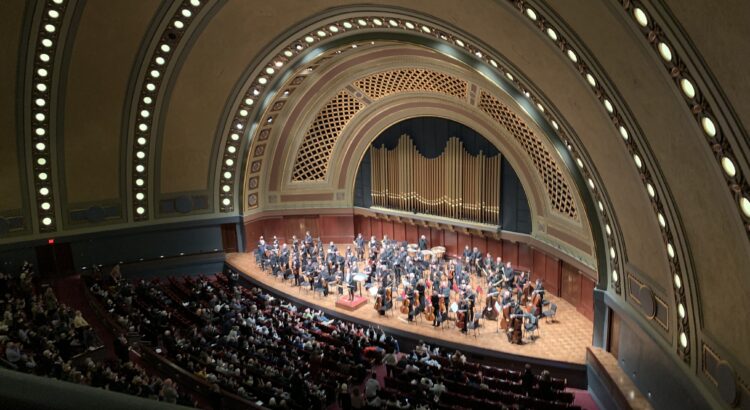Call me biased, but one of the best parts of being a violinist has to be the concertos. They’re iconic, flashy, and for the musician playing, career-defining. The Bruch Violin Concerto No. 1, in particular, has a special place in my heart, so I was delighted to hear that concertmaster David Kim would be performing it alongside the Philadelphia Orchestra at the Hill Auditorium in concert last Saturday evening. A quintessential staple of violin repertoire, the piece truly comes alive with the many different interpretations by its players.
Opening the concert, however, was a more avant-garde piece by contemporary composer Missy Mazzoli. The Sinfonia (for Orbiting Spheres) sneaks in with a distinctly soft, grainy texture provided by violin and harmonica before expanding to bellowing slides in the lower strings. A mixture of serene and ominous, the composition gives off the impression of irregular, interfering sound waves to convey the vastness of space. Due to its unique instrumentation, they had to take some time to switch out quite a few instruments before the following concerto!
If I were to give one word to describe each movement of the Bruch, I would say intense, longing, and triumphant. However, what makes the concerto so compelling is the complexity of emotion that lies within each category. The violin enters the first movement with a subtle, unassuming G, before erupting into crisp double stops and finger gymnastics. The orchestral passages here, a textbook example of tension-building, are somehow just as attractive as the solo. David Kim’s version had an unmistakably sweet quality, which particularly shined when he got to the slower second movement. From the balcony, I had a great view of his precise bow control which allowed for both a timid, “held back” sound and an unhindered singing voice above the orchestra. In contrast, Kim’s third movement was light, clean, and playful despite the heaviness of all the chords. It was a pleasure to be able to hear in person.
Concluding the concert was Schubert’s Symphony No. 9 in C Major. I had never heard it before, but a particular amusing comment written by Doyle Armbrust of the Spektral Quartet in the program guided my listening: “Franz Schubert wanted to be an opera composer with all the desperation of a hollow-eyed film school grad shopping a script from his garden-level studio in Burbank. My take on him is that he would have been a lot like that one friend — you know, the one who appears to have taken up permanent residence on your couch, but is somehow redeemed by his charisma in conversation?”
The symphony interestingly begins with just horns. A lighthearted melody gets passed around the orchestra like a breath of fresh air—this is later bolstered by bass drum and big, operatic tuttis. Nathalie Stutzmann conducts with an infectious swagger, which I enjoyed watching here. My favorite movement was probably the second one, opening with a plucky oboe solo over a quirky, mysterious, tiptoeing base of strings and interrupted with sudden outbursts of emotion.
Overall, the concert program brought forth a lovely combination of familiar and unfamiliar sounds. As expected, the Philadelphia Orchestra did justice to these works!


